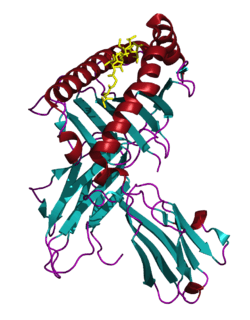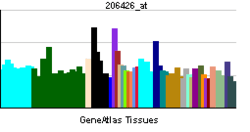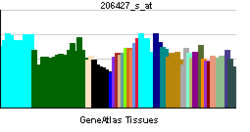MLANA
| MLANA | |||||||||||||||
|---|---|---|---|---|---|---|---|---|---|---|---|---|---|---|---|
 |
|||||||||||||||
| |||||||||||||||
| Identifiers | |||||||||||||||
| Aliases | MLANA, MART-1, MART1, melan-A | ||||||||||||||
| External IDs | MGI: 108454 HomoloGene: 4026 GeneCards: MLANA | ||||||||||||||
| Genetically Related Diseases | |||||||||||||||
| multiple sclerosis[1] | |||||||||||||||
| RNA expression pattern | |||||||||||||||
  | |||||||||||||||
| More reference expression data | |||||||||||||||
| Orthologs | |||||||||||||||
| Species | Human | Mouse | |||||||||||||
| Entrez | |||||||||||||||
| Ensembl | |||||||||||||||
| UniProt |
| ||||||||||||||
| RefSeq (mRNA) | |||||||||||||||
| RefSeq (protein) |
| ||||||||||||||
| Location (UCSC) | Chr 9: 5.89 – 5.91 Mb | Chr 19: 29.7 – 29.71 Mb | |||||||||||||
| PubMed search | [2] | [3] | |||||||||||||
| Wikidata | |||||||||||||||
| View/Edit Human | View/Edit Mouse |
Protein melan-A also known as melanoma antigen recognized by T cells 1 or MART-1 is a protein that in humans is encoded by the MLANA gene.[4] A fragment of the protein, usually consisting of the nine amino acids 27 to 35, is bound by MHC class I complexes which present it to T cells of the immune system. These complexes can be found on the surface of melanoma cells. Decameric peptides (26-35) are being investigated as cancer vaccines.
Discovery and nomenclature
The names MART-1 and melan-A were coined by two groups of researchers who independently sequenced the gene for this antigen in 1994. Both names are currently in common use. Kawakami et al. at the National Cancer Institute coined the term MART-1, which stands for "melanoma antigen recognized by T-cells."[5] Coulie et al. of Belgium called the gene melan-A, presumably an abbreviation for "melanocyte antigen."[6]
Clinical significance
MART-1/melan-A is a protein antigen that is found on the surface of melanocytes. Antibodies against the antigen are used in the medical specialty of anatomic pathology in order to recognize cells of melanocytic differentiation, useful for the diagnosis of a melanoma. The same name is also used to refer to the gene which codes for the antigen.
The MART-1/melan-A antigen is specific for the melanocyte lineage, found in normal skin, the retina, and melanocytes, but not in other normal tissues. It is thus useful as a marker for melanocytic tumors (melanomas) with the caveat that it is normally found in benign nevi as well.
In many immunological studies melan-A peptides serve as a positive control for T-cell priming experiments. This is due to the fact that its precursor frequency among cytotoxic T-cells is one of the highest known so far, making it easy for antigen presenting cells to evoke peptide-specific responses.
Structure
MART-1/melan-A is a putative 18 kDa transmembrane protein consisting of 118 amino acids. It has a single transmembrane domain.
Regulation
Its expression is regulated by the Microphthalmia-associated transcription factor.[7][8]
References
- ↑ "Diseases that are genetically associated with MLANA view/edit references on wikidata".
- ↑ "Human PubMed Reference:".
- ↑ "Mouse PubMed Reference:".
- ↑ "Entrez Gene: MLANA melan-A".
- ↑ Kawakami Y, Eliyahu S, Delgado CH, Robbins PF, Rivoltini L, Topalian SL, Miki T, Rosenberg SA (April 1994). "Cloning of the gene coding for a shared human melanoma antigen recognized by autologous T cells infiltrating into tumor". Proc. Natl. Acad. Sci. U.S.A. 91 (9): 3515–9. doi:10.1073/pnas.91.9.3515. PMC 43610
 . PMID 8170938.
. PMID 8170938. - ↑ Coulie PG, Brichard V, Van Pel A, Wölfel T, Schneider J, Traversari C, Mattei S, De Plaen E, Lurquin C, Szikora JP, Renauld JC, Boon T (July 1994). "A new gene coding for a differentiation antigen recognized by autologous cytolytic T lymphocytes on HLA-A2 melanomas". J. Exp. Med. 180 (1): 35–42. doi:10.1084/jem.180.1.35. PMC 2191574
 . PMID 8006593.
. PMID 8006593. - ↑ Du J, Miller AJ, Widlund HR, Horstmann MA, Ramaswamy S, Fisher DE (2003). "MLANA/MART1 and SILV/PMEL17/GP100 are transcriptionally regulated by MITF in melanocytes and melanoma". Am. J. Pathol. 163 (1): 333–43. doi:10.1016/S0002-9440(10)63657-7. PMC 1868174
 . PMID 12819038.
. PMID 12819038. - ↑ Hoek KS, Schlegel NC, Eichhoff OM, et al. (2008). "Novel MITF targets identified using a two-step DNA microarray strategy". Pigment Cell Melanoma Res. 21 (6): 665–76. doi:10.1111/j.1755-148X.2008.00505.x. PMID 19067971.
Further reading
- Zippelius A, Pittet MJ, Batard P, et al. (2002). "Thymic selection generates a large T cell pool recognizing a self-peptide in humans.". J. Exp. Med. 195 (4): 485–94. doi:10.1084/jem.20011658. PMC 2193620
 . PMID 11854361.
. PMID 11854361. - Moritake H, Sugimoto T, Asada Y, et al. (2002). "Newly established clear cell sarcoma (malignant melanoma of soft parts) cell line expressing melanoma-associated Melan-A antigen and overexpressing C-MYC oncogene.". Cancer Genet. Cytogenet. 135 (1): 48–56. doi:10.1016/S0165-4608(01)00641-0. PMID 12072203.
- Dutoit V, Rubio-Godoy V, Pittet MJ, et al. (2002). "Degeneracy of antigen recognition as the molecular basis for the high frequency of naive A2/Melan-a peptide multimer(+) CD8(+) T cells in humans.". J. Exp. Med. 196 (2): 207–16. doi:10.1084/jem.20020242. PMC 2193921
 . PMID 12119345.
. PMID 12119345. - Mantovani S, Palermo B, Garbelli S, et al. (2002). "Dominant TCR-alpha requirements for a self antigen recognition in humans.". J. Immunol. 169 (11): 6253–60. doi:10.4049/jimmunol.169.11.6253. PMID 12444131.
- Strausberg RL, Feingold EA, Grouse LH, et al. (2003). "Generation and initial analysis of more than 15,000 full-length human and mouse cDNA sequences.". Proc. Natl. Acad. Sci. U.S.A. 99 (26): 16899–903. doi:10.1073/pnas.242603899. PMC 139241
 . PMID 12477932.
. PMID 12477932. - Du J, Miller AJ, Widlund HR, et al. (2003). "MLANA/MART1 and SILV/PMEL17/GP100 are transcriptionally regulated by MITF in melanocytes and melanoma.". Am. J. Pathol. 163 (1): 333–43. doi:10.1016/S0002-9440(10)63657-7. PMC 1868174
 . PMID 12819038.
. PMID 12819038. - Mandelcorn-Monson RL, Shear NH, Yau E, et al. (2003). "Cytotoxic T lymphocyte reactivity to gp100, MelanA/MART-1, and tyrosinase, in HLA-A2-positive vitiligo patients.". J. Invest. Dermatol. 121 (3): 550–6. doi:10.1046/j.1523-1747.2003.12413.x. PMID 12925214.
- Ghorab Z, Jorda M, Ganjei P, Nadji M (2004). "Melan A (A103) is expressed in adrenocortical neoplasms but not in renal cell and hepatocellular carcinomas.". Appl. Immunohistochem. Mol. Morphol. 11 (4): 330–3. doi:10.1097/00129039-200312000-00009. PMID 14663359.
- Murer K, Urosevic M, Willers J, et al. (2005). "Expression of Melan-A/MART-1 in primary melanoma cell cultures has prognostic implication in metastatic melanoma patients.". Melanoma Res. 14 (4): 257–62. doi:10.1097/01.cmr.0000136713.21029.56. PMID 15305155.
- Gerhard DS, Wagner L, Feingold EA, et al. (2004). "The status, quality, and expansion of the NIH full-length cDNA project: the Mammalian Gene Collection (MGC).". Genome Res. 14 (10B): 2121–7. doi:10.1101/gr.2596504. PMC 528928
 . PMID 15489334.
. PMID 15489334. - Kucher C, Zhang PJ, Pasha T, et al. (2005). "Expression of Melan-A and Ki-67 in desmoplastic melanoma and desmoplastic nevi.". The American Journal of dermatopathology. 26 (6): 452–7. doi:10.1097/00000372-200412000-00002. PMID 15618925.
- Hoashi T, Watabe H, Muller J, et al. (2005). "MART-1 is required for the function of the melanosomal matrix protein PMEL17/GP100 and the maturation of melanosomes.". J. Biol. Chem. 280 (14): 14006–16. doi:10.1074/jbc.M413692200. PMID 15695812.
- Godefroy E, Scotto L, Souleimanian NE, et al. (2006). "Identification of two Melan-A CD4+ T cell epitopes presented by frequently expressed MHC class II alleles.". Clin. Immunol. 121 (1): 54–62. doi:10.1016/j.clim.2006.05.007. PMID 16814609.
- Kono M, Dunn IS, Durda PJ, et al. (2007). "Role of the mitogen-activated protein kinase signaling pathway in the regulation of human melanocytic antigen expression.". Mol. Cancer Res. 4 (10): 779–92. doi:10.1158/1541-7786.MCR-06-0077. PMID 17050671.
- Bioley G, Jandus C, Tuyaerts S, et al. (2007). "Melan-A/MART-1-specific CD4 T cells in melanoma patients: identification of new epitopes and ex vivo visualization of specific T cells by MHC class II tetramers.". J. Immunol. 177 (10): 6769–79. doi:10.4049/jimmunol.177.10.6769. PMID 17082590.
- Roma AA, Magi-Galluzzi C, Zhou M (2007). "Differential expression of melanocytic markers in myoid, lipomatous, and vascular components of renal angiomyolipomas.". Arch. Pathol. Lab. Med. 131 (1): 122–5. PMID 17227112.
- Yuan F, Georgiou T, Hillon T, et al. (2007). "Crystallization and preliminary X-ray structural studies of a Melan-A pMHC-TCR complex.". Acta Crystallogr. Sect. F Struct. Biol. Cryst. Commun. 63 (Pt 9): 758–60. doi:10.1107/S1744309107037244. PMC 2376329
 . PMID 17768347.
. PMID 17768347.